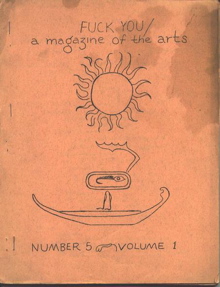Straight Up |: June 2007 Archives
It lacks the humor of the blowjob sign displayed outside the White House several years ago. But the full-page ad in this morning's NY Times shows more fervor. Talk about powerful!
 Postscript: Now for the longhand:
Postscript: Now for the longhand:
YOUR GOVERNMENT, on the basis of outrageous lies, is waging a murderous and utterly illegitimate war in Iraq, with other countries in its sights.YOUR GOVERNMENT is openly torturing people, and justifying it.
YOUR GOVERNMENT puts people in jail on the merest suspicion, refusing them lawyers, and either holding them indefinitely or deporting them in the dead of night.
YOUR GOVERNMENT is moving each day closer to a theocracy, where a narrow and hateful brand of Christian fundamentalism will rule.
YOUR GOVERNMENT suppresses the science that doesn't fit its religious, political and economic agenda, forcing present and future generations to pay a terrible price.
And that's just the beginning. Click on the image and listen to Olympia Dukakis deliver "the call" to drive out the BananaRepublic and impeach the regime's leaders for war crimes. It's wall-to-wall stunning. ("Olympia Dukakis is begging for a one-way ticket to Gitmo." -- David Ehrenstein)
When Ed Sanders made the cover of LIFE magazine 40 years ago -- on Feb. 17, 1967 -- the editors took note of a growing resistance to the mainstream with a cover line that read: "The worldwide underground of the arts creates THE OTHER CULTURE." The "human be-in" in San Francisco had made news four weeks earlier, on Jan. 14. The "summer of love" -- now being memorialized in a show at the Whitney Museum, "Art of the Psychedelic Era" -- was still several months away.
 Sanders was not only a founding member of The Fugs, whose songs included "Kill for Peace," "Slum Goddess," "CIA Man," "Group Grope" and "River of Shit," he owned the Peace Eye bookstore on Manhattan's Lower East Side, where he published a mimeographed literary rag called Fuck You / a magazine of the arts. (Arrested and charged with obscenity, he was found not guilty.)
Sanders was not only a founding member of The Fugs, whose songs included "Kill for Peace," "Slum Goddess," "CIA Man," "Group Grope" and "River of Shit," he owned the Peace Eye bookstore on Manhattan's Lower East Side, where he published a mimeographed literary rag called Fuck You / a magazine of the arts. (Arrested and charged with obscenity, he was found not guilty.)
Meanwhile, the hippie counterculture was turning political. Abbie Hoffman, Jerry Rubin and others (including Paul Krassner, who reputedly coined the term Yippie at a 1967 New Year's Eve party) founded the Youth International Party. Peace activists led huge protests against the Vietnam War later that year. On Oct. 21 more than 100,000 demonstrators marched in Washington, where Yippie leaders tried to "levitate the Pentagon" and Sanders performed an "exorcism."
 The most dramatic, most violent culmination of the politicized counterculture -- bombings by the Weather Underground excepted -- came on the streets of Chicago. Yippies clashed with police during the 1968 Democratic Party Convention and were charged with conspiracy in the notorious trial of the Chicago Seven. (Their convictions were reversed on appeal.)
The most dramatic, most violent culmination of the politicized counterculture -- bombings by the Weather Underground excepted -- came on the streets of Chicago. Yippies clashed with police during the 1968 Democratic Party Convention and were charged with conspiracy in the notorious trial of the Chicago Seven. (Their convictions were reversed on appeal.)
But while all of that has receded into history, the counterculture itself has merged so comfortably with the mainstream that its concerns, if not its aspirations, are often similar to those of today's homogenized society. Issues that were once too "far out" for the mainstream to take seriously are now part of common debate. Just yesterday, referring to his antiwar stance, Michael Moore said in a press conference for "Sicko," his latest movie: "I am now in the mainstream majority, which is weird."
Still, it's worth recalling the nascent days of the counterculture, when "beatnik" was the opprobrious term applied to Sanders, Tuli Kupferberg and their ilk well before underground art turned psychedelic and the "summer of love" had hippies putting flowers in their hair. For a fine retrospective, check out the current summer-long show "FUCK FOR PEACE: A History of The Fugs." It runs through Sept. 8 at Printed Matter on Manhattan's West Side in Chelsea. Psychedelic it's not, but it opens your eyes.
![GRAHAM GREENE [AP/Wide World Photos]](http://www.notablebiographies.com/images/uewb_05_img0315.jpg) As American and Iraqi troops launch an offensive near Baghdad, it may be unwise to apply a description of the morale of the French troops at Dien Bien Phu to the mood of the American troops in Iraq.
As American and Iraqi troops launch an offensive near Baghdad, it may be unwise to apply a description of the morale of the French troops at Dien Bien Phu to the mood of the American troops in Iraq.
But even given the enormous differences between the Indochina war and the one in Iraq -- in geography, battle conditions, politics, culture, technology and, of course, causes -- I can't help noticing the aptness of Graham Greene's observation: On the eve of their defeat, in May 1954, the French troops had reached a period "not so much of exhaustion as of cynicism and dogged pride -- they believed in no solution but were not prepared for any surrender."
Greene spent only a day and a night at Dien Bien Phu in January of 1954, two months after six parachute battalions were dropped on the French outpost in a doubling of the military force there. But he sensed the mood accurately, surge notwithstanding. "It was no novelist's imagination which felt the atmosphere heavy with doom," he writes, "for these men were aware of what they resembled -- sitting ducks."
Is the BananaRepublic on its way out? I don't mean just the elected officials like the President With His Head Up His Ass and his Attack Dog in their lame-duck days. I mean their modus operandi or, if you like, their institutional style and substance.
Not to stretch the point, but "there is no crueller tyranny than the one exercised in the shadow of the law, and with the colours of justice." That's Montesquieu, via Clive James, speaking about the Roman emperor Tiberius. "Montesquieu was impressed by the efficiency Tiberius brought to the business of perverting the judicial system," James writes.
Jess Bravin, reporting in today's Wall Street Journal, gives me hope our boys are less efficient. He writes that the "effort to create a separate legal system for the war on terrorism may be foundering."
His latest moniker on the front page of The New York Times print edition did not make the paper's Web site, except here, where the text type is so small it's unreadable. So I offer it now as a public service: "American President, Albanian Idol." It's the caption head on the photo -- above the fold, no less.
![AMERICAN PRESIDENT, ALBANIAN IDOL, print edition NYT of June 11, 2007 [Photo: Gerald Herbert/AP]](http://www.artsjournal.com/herman/Albanian%20Idol%20cropped%20299.jpg) Did the news editors of The Times believe the implied satirical content needed to be eliminated for the Web? I didn't ask. Maybe the newly installed public editor will.
Did the news editors of The Times believe the implied satirical content needed to be eliminated for the Web? I didn't ask. Maybe the newly installed public editor will.
But at least the following exchange in the story itself -- a great snapshot by Sheryl Gay Stolberg -- was allowed to stand:
Sites to See
AJ Blogs
AJBlogCentral | rssculture
Terry Teachout on the arts in New York City
Andrew Taylor on the business of arts & culture
rock culture approximately
Rebuilding Gulf Culture after Katrina
Douglas McLennan's blog
Art from the American Outback
John Rockwell on the arts
Jan Herman - arts, media & culture with 'tude
dance
Apollinaire Scherr talks about dance
Tobi Tobias on dance et al...
media
Jeff Weinstein's Cultural Mixology
Martha Bayles on Film...
music
Greg Sandow performs a book-in-progress
Howard Mandel's freelance Urban Improvisation
Focus on New Orleans. Jazz and Other Sounds
Exploring Orchestras w/ Henry Fogel
Kyle Gann on music after the fact
Doug Ramsey on Jazz and other matters...
Greg Sandow on the future of Classical Music
Norman Lebrecht on Shifting Sound Worlds
publishing
Jerome Weeks on Books
Scott McLemee on books, ideas & trash-culture ephemera
theatre
Elizabeth Zimmer on time-based art forms
visual
Public Art, Public Space
John Perreault's art diary
Lee Rosenbaum's Cultural Commentary
Tyler Green's modern & contemporary art blog
